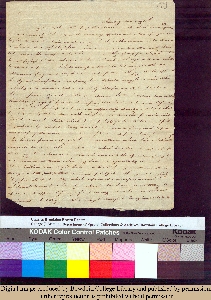 ― [page break] ― ― [page break] ―
Saturday Noon. May 20.~th
My friend, I cannot express the pleasure with which I read your ‸ letter
The more accurately I know you the more my affection and esteem for you are
heightend, and I exclaim involuntarily, "Surely in the spacious world there is
no one ‸ for whom it is possible ‸ for me to feel a more sincere and ardent attachment than
to this admirable correspondent? Who is more worthy of my friendship? And shall
he not possess it? Yes. Whatever be his sentiments with regard to me, whether
he esteem or despise me, I shall always contemplate his image with the
Enthusiasm of a friend. My heart already flutters with joy at his approach
Serenity and chearfullness accompany him. I should struggle in vain to be
unhappy in his presence; but melancholy oppresses me at his departure.
Let me assiduously cultivate his good opinion. Let me introduce him to the
knowledge of myself, for is it not necessary that he should know me before he
loves me? But perhaps he knows me sufficiently already, or at least that
knowledge is only to be valued with which his own observation furnishes him
But how much is there, which it is impossible for him to know unless it
be particularly revealed? I long to make him master of my soul; to give
him proofs of the most unbounded confidence, and feel a kind of Uneasiness
when hindered from revealing to him circumstances, which I have hitherto
imagined too sacred to be revealed, and which have been buried in profoun
=est secrecy. I have been so accustomed to reserve; To the affectation of gayety
and unconcern, at times when my bosom was agitated by the most
violent Emotions; to counterfiet Sentiments to which my heart was utterly a
stranger and to
[gap]
pretend ignorance of Subjects, with regard to which
I possessed all the knowledge which experience can confer; a mask became
so habitual to me, that I scarcly rembmber how I was induced to lay it,
asside, and to appear before my friends in my native character. Mutual
Confidence is the test of friendship, and yet, though to Bringhurst & to Wilkins
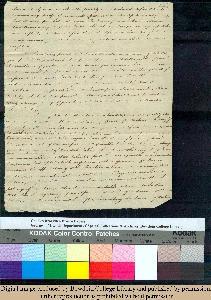 ― [page break] ― ― [page break] ―
I had silently sworn unalterable fidelity and Attachment, before I had
recieved any proofs of reciprocal affection. I am at a loss to account for my
first departure from habitual reserve; But since, from whatever motive, I
have thrown away disguise, I feel a childish and precipitate eagerness to be
more explicit, and to set before them the life and character of their
newly acquired friend, all its degrading contrasts and all its calamitous
vicissitudes
Think not, my friend, that I will be out done in generosity. What is
your opinion? Do you think that friendship can subsist between three persons?
This question is of great importance. Do not you percieve what momentous
consequences will flow from its decision? Never will I bereave Bringhurst of
his friend. Never will I take his Wilkins from him: To Wilkins: ami
excellent and amiable as he is, you have an unquestionably prior claim,
and believe me, my friend, if his attachment for me should weaken those
bonds by which he is at present united to you, I should not hesitate in
totally estranging myself from him. Whatever it should cost me I would
restore him to you.
I never yet doubted that love and friendship were, in reality, the
same, and I do not scruple to mention my affection for Wilkins as a proof of
this position. It is somewhat more than two years since I first became acquain=
=ted with him. "Wilkins! (said I to Franklin and Evans who first mentioned
him to me.) Who is he? What region had the honour of producing him?
Is he not a disciple of the pitiful and despicable Tod? And "Can any thing
good thing come out of Nazareth?" They assured me that my prejudices
were unreasonable; and that I should find him an agreable and instructive
Companion, but I placed little confidence in their assurances; for I never
considered the approbation of either Franklin or Evans as an unnerring test
of intellectual or moral excellence, but how were ‸ my prejudices annihilated,
by the sight of him! No sooner did I see and converse with him, than I
felt myself attached
[gap]
to him by an inconcievable and irresistable charm
that, like the lightening of love, left me not at liberty to pause or deliberate.
Davidson was then living, and how often, in describing the character of Wilkins
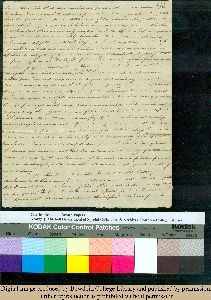 ― [page break] ― ― [page break] ―
have I told him, that there was but one person in the world, whom, after
Davidson I should wish to call my friend. To what cause shall I impute
shall I impute the origin or continuance of this attachment? Great are the
effects which are produced by polished and insinuating manners like those
of Wilkins, but these are certainly inadequate to the effects which were produced
in me. Our dispositions are widely dissimilar. The occupations with which
each is most delighted are totally different. Scarcely any thing can be less
congenial to my taste and temper than the usual tenor of his conversation and
deportment, and yet, my friend, it is not easy to describe the tenderness that
overflows my bosom at the Sight of him: I can scarcely refrain from embracing
him. Tears of affection start into my Eyes. When I look upon him, that
incorrigible levity, that elaborate, ‸ thoughtlessness which would so much displease me in
another person, does not only cease to disgust, but absolutely charms me.
I cannot mingle in his mirth. Laughter and gayety, give me no pleasure
at any time, and, were I to judge from former experience, I should suppose
them to be most disgustful and unseasonable in the intercourse of genuine
Friendship, and yet what contradictions are reconciled, what Miracles are
performed by the magical presence of this beloved person? I can now spend
with pleasure,
[gap]
untedious and delightful hours at the most tasteless
and insignificant amusements. If, during my intercourse with Davidson,
I had dreamed that I saw us together, ingaged at loo or chess, how should
I have been astonished at the Novelty and Singularity of the Spectacle?
How should I have ridiculed the predictions of one who should have assured
the dream was amorous, and that the rapture and Sublimity of intellectual
converse, exalted by the enthusiasm of the most sacred friendship would
in time, be changed for the execrable and absurd employments of cutting
and dealing?
After this how is it possible for me to doubt that my
attachment to Wilkins arises from an involuntary and preternatural impulse
that I am absolutely enamoured of him? But of what species is my love
for Bringhurst? For have I not the sincerest affection for him? Do I not hail
his approach with pleasure and recieve the highest satisfaction from his
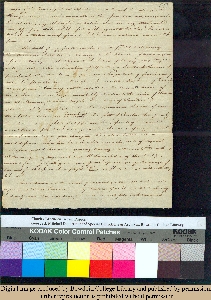 ― [page break] ― ― [page break] ―
company? Do I not regret his departure and lament his absence? . All
these questions must be answered in the affirmative, and, consequently,
I must esteem myself his friend, but in what does my attachment to
him differ from that which I feel with regard to the other? It is not so
violent; so tender; so impassioned; but it is more rational and not less
permanent.
The death of my friend was the period of ‸ my intellectual progress
The Catastrophe of the drama. No longer do the phantoms of Ambition glide
before, me. My eyes are shut against the beams of literary glory. My ears,
no longer listen to the acclamations of applauding Senates; to the voice of
popularity. My hands no longer weave the garland of forensic oratory
Whither has fled the lustre that formerly invested the brow of Demosthe
-nes and Perecles? Drooping and tarnished are the laureate honours of
Cicero. I am now no longer irresistably attracted to the shrines of Roman
and Attic Eloquence. Ye Visions, brighter than those of Paradise! Ye
phantoms of Elysian felicity! At whose appearance the host of domes=
=tic solitudes Solicitudes van[gap]
vanished! Thou ghost of Pericles! that formerly
haunted, my benighted footsteps, and thou, spirrit of reanimated
Cicero! that so often hast harangued from the rostra of my Imagination
whose presence has so often changed the naked heath into a
crowded forum; whose lips have breathed anew the soul of eloquent
compassion, and decked an imaginary Murray or a Mimic Pitt with
all the energies of Argument and all the melodies of elocution! Ye are
vanished from my sight,! ye are gone forever! Ye accompany the images of
love and friendship in their flight! They are fled, and ye will not stay
behind!
Social pleasures and the converse of congenial spirrits, is all that remains
to give me pleasure. I am enamoured of obscurity, of social and lettered obscurity
In obscurity shall I live and die, if fortune smile, and fate withstand not.
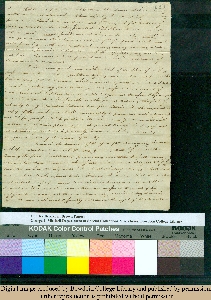 ― [page break] ― ― [page break] ―
But let me drop this lamentable strain. It has charms which are not easily
resisted and I cannot relinquish it without difficulty. I would willingly amuse my
friend, and I think he derives Amusement from my imperfect Narratives, of
fictitious Adventures. I wish that ‸ the journal to which I have alluded, were written
with as much manual facility and expedition as I am able mentally to
arrange and record the voluminous contents of it, for, if such were the case, I
could furnish you with a moderate volume every evening, but my dilatory
and laborious pen, will not keep pace with the rapidity of my conceptions
and I have other more interesting avocations to which my intervals of
liesure must be dedicated
I will amuse you however with a sketch of the plan of one of my
performances, written at a period propitious to fancy and invention, and favourable
to the display of that eloquence which is dictated by truth and nature; I despair
of ever having it in my power to shew you this performances, on account of
circumstances which I shall presently explain to you, and therefore I less scruple
to describe to you the series of events, and the general texture of the fable. If,
contrarily to my expectation, I should here after obtain either the original or
a copy of this work, you shall immediately be presented with a transcript
and I hope, your friendship for the writer will induce You to read it with
attention and to derive pleasure from the perusal, though the progress and
catastrophe of the tale, is previously known, and it be, in some degree,
therefore, divested of the charms of Novelty
It was in the Summer of the Year 1788, during my Connection
with the excellent and amiable Henrietta G—— that I first read the
Eloisa of Rousseau. I could never procure any more than the first & second
volumes, but these I read with infinite avidity and delight. Miss G.
had this work in the original, but notwithstanding all my solicitations
and
[gap]
intreaties, she refused to lend it to me. She declared that it was the
most seductive and pernicious book that she had ever read, and that
she would nither read it a second time nor suffer it to go out of her
possession: This refusal and those invectives only heightened by desire to
peruse it, and with some difficulty I obtained the sight of the translations
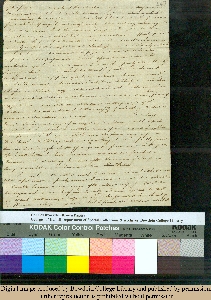 ― [page break] ― ― [page break] ―
of the first and second parts of that celebrated and fascinating performance.
On my next visit to her she quickly, discovered, by certain allusions which I
made during the course of our conversation, that I had plucked the forbidden
fruit. She, half angrily and half-jocosely upbraided my contumacy and
repeated her opinion that the work was dangerous. This gave rise to an
animated dispute, in which I endeavoured to maintain an opposite opinion
but I acted the part of an Advocate with so much indiscreet vehemence as
absolutely to offend this scrupulous and delicate fair one, and the only condition
on which she would be perswaded to forgive me, was that I should
compose a similar performance, in which different maxims should be
incultivated, of which love and friendship in all their purity and sublimity
should form the basis, and in which the triumph of virtue over the most
lawless and impetuous passions, of duty over inclination, should be as vividly
and forcibly described as I was able. She left me at liberty to make either
Rousseau or Richardson my model, and to write either in the narrative or
epistolary method. Nothing could be more arrogant and audacious ‸ than for one of
my youth and inexperience to attempt to tread in the footsteps of those
illustrious writers, and nothing but the necessity of submitting to absolute
commands could induce me to inage in so arduous an undertaking.
I accordingly immured myself in my chamber, placed a table opposite
a window which overlooked the meeting streems of Delaware and Schuylkill
and from which the eye might traverse the former river as far as
Red-Bank and Billingsport, and, by writing almost incessantly from
Sun rise to Midnight for thirty days, in the finest season in the year,
I performed the task which was imposed upon me, and finished a
Romance, in the epistolary form and after the manner of Rousseau
though somewhat more voluminous than "Jlie. "Julie"
In a work, written with so much haste, and with such little premedi
tation, defects must necessarily abound. I concieved a general idea of the plan
as I walked homeward, one evening after visiting Miss G.— I, at that time
lived four miles and an half from the city, and never left till her till
ten OClock. Next morning I adjusted my table, furnished it with writing
implements, and began my work which I finished in the time which I
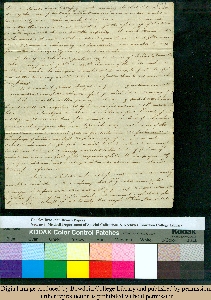 ― [page break] ― ― [page break] ―
have mentioned. I sent to Miss. G— in the evening all that I had written
during the cource of that day, without revision or correction, and waited on
her personally once or twice a week, to hear her comments and remarks
I mention these circumstances as apollogies for the defectiveness of the plan
for with regard to the execution, the rapidity with which it was written
rather added to its excellence than detracted from it, and all slighter inaccu
racies of grammar orthography and punctuation were amended by my
fair critic, whose sagacity was equal to her taste.
The hero of my tale I distinguished by the Name of Julius Brownlow
I believe in every work of this kind, the character of the writer, such as it,
really, is, or such as he imagines, or wishes it to be, may be found. I confess
that at this time my ambition extended no farther than to act and speak
like Julius.
On the amiable Julius therefore I conferred every excellence, mental
and corporeal, yet mingled with certain failings which I discovered in myself
and which reduced this exalted personage to the level of probability. I made
his stature tall and majestic, his l[gap]
limbs graceful and exquisitely proportioned
his countenance beautiful and blooming and his eyes full of Sweetness and
intelligence. He was the heir of an ancient and opulent family, whose
patrimonial possessions lay near Kesswick in Cumberland one of the
wildest and most romantic spots in Great Britain. His father died in
his
the infancy of Julius, and left the guardianship of him and his sister
Julietta, who were brought forth at a birth, to their mother: A woman of
beauty and talents, but strongly addicted to the levities of fashion, of
violent Ambition, and full of the prejudices of birth. She was passionately
fond of her children, and displayed, in their education, a true maternal
tenderness and prudence.
Julius and Julietta, who, as I before said, were twins, so exactly
resembled each other in their infancy, that they one could scarcely be
distinguished from each other, but as they grew up Julietta retained
only those features of her brother which were consistent with the highest
degree of female softness and beauty. This angelick pair ‸ passed their childhood
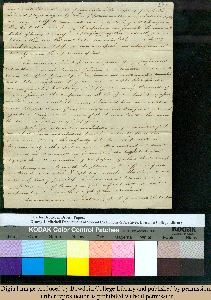 ― [page break] ― ― [page break] ―
and learned the rudiments of education in the company of each other.
Julius displayed very early tokens of future excellence, and Julietta display
a memory not less tenacious, and an an understanding not less vigorous
than her brother. A Conformity of dispositions and pursuits, the constant
habit of living, learning, and playing together, gradually produced
between these two, the most tender and inviolable union that of
which two persons, of different Sexes are capable, and which does not
absolutely deserve the appellation of love
This union, my friend, formed one pillar of my performance
and, in the conduct and characters of Julius and Julietta, I endeavoured
to trace the effects of friendship, of the purest and most exalted Friendship
kind. I have, my dearest Bringhurst, long and deeply philosophised on
love and friendship, but all my philosophy was merely the result of
my own feelings. I have experienced all the effects which those passions
can produce on a susceptible mind. I have not been an inattentive
or unintelligent observer of my own emotions, and therefore do not want
a guide in tracing all the mazes of the human heart when under
the dominion of those seraphic passions
With regard to Julius and Julietta, every cause existed of wh
from which sacred and celestial friendship naturally flows. Their
personal resemblance, the conformity of tempers and pursuits, and
their similarity with respect to age, and their constant and domestic
intercource, are all circumstances favourable in the hig[gap]ist highest
degree, to the birth and nurture of this passion: of which the tenderness
and delicacy must be greatly heightened by the difference of sexes,
and their kindred, while it kept love (which, in the opinion of some
is the only kind of friendship which can subsist between persons
unrelated, and not of the same sex.) at a sufficient distance, must be
supposed to contribute to the strength of their attachment
This situation was somewhat new, for Rousseau and Richardson
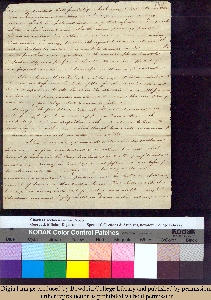 ― [page break] ― ― [page break] ―
had only described that friendship which may subsist between two
men or two women, but they and have given us no striking
pictures of sisterly or fraternal love, and of that refined and exquisite
relation which must arise when the causes, producing friendship,
operate in uniting two brothers or two sisters or a brother and a sister.
That such causes may operate with regard to those, as well as with
respect to absolute irrelatives is not to be denied, and the union, which
results from those causes operating in the domestic sphere, must be
proportionally more perfect, as opportunities are here afforded of
more frequent converse and intire confidence than in other situations
I have heard that Richardson, in his original plan, intended to
have made Miss Howe the Sister of Clarissa, but that he afterwards
found it expedient to alter his plan. The alteration was doubtless proper
but had it not been made, we should have seen the description of
a new kind of friendship.—But to return to Julius—
Having in the first place, selected all the external circumstances
proper for my design, it was next my province to endow them with
corresponding talents and dispositions; with souls attuned to love and
Sympathy, and with virtue which, though heroic and uncommon, I
contrived to render not romantic or incredible.
Julius, at a proper age, was sent to Eton; and his Mother and
Sister removed from Cumberland to Middlesex, to a seat, which
belonged to Julius, in the Neighbourhood of London. The graceful Student
made a rapid progress in knowledge, and at fifteen was quallified for
his entrance into the University. During his stay at Eton, Julius
maintained a constant correspondence with his Sister, and spent every
interval of Liesure at this Mothers house. Both Sister and Brother
had acquired an exquisite taste for poetry, were adepts in english
Literature, and were highly skilled in penmanship and composition.
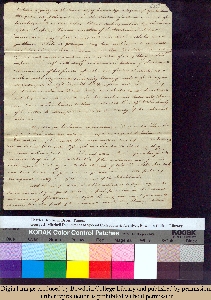 ― [page break] ― ― [page break] ―
Instead of going to the University, of Cambridge or Oxford, passed two
two years at Gottingen, under the tuition of a Man eminent for
Knowledge and virtue whom I have distinguished by the name
of Mr. Lutphen. He was a native of Switzerland, but had
recieved an english education and was both a scholer and a
gentleman. While at Gottingen, My hero continued to correspond
with his sister, in like manner as at Eton. His letters were extreemly
copious and minute, containing a relation of every thing which
respected himself, with strong and dramatic pictures of the characters
and manners of his friends, associates and fellow students, and
written with elegance and vivacity. Having resided for two years
at Gottingen, he left it with his preceptor, and, after residing
for twelve months, in France Italy and Switzerland, he returned
into England and retired with his Mother and Sister into Brown=
=low hall in Cumberland. Here he devoted himself to the Society
of his sister, to contemplation and to the study of the sublimest
sciences.
At Gottingen he became acquainted with Lauder Ellen, the
Son of a Scottish Advocate, superior in age, and equal to Julius in
virtue and accomplishments. Their acquaintance soon ripens into Intimacy
and on Julius' Return to Kesswick and Lauders to Edinburg, they
commence a Correspondence with each other. Julius, gives his friend,
an account of his presents Situation, of his resolutions and opinions
with regard to study and to the conduct of life. He relates his dayly
avocations, his ramblings and musings, and draws minute pictures of
the adjacent country and of the manners of the Inhabitants.
With this correspondence, I at first intended to begin my work.
There is not country in Great Britain, or perhaps in Europe that abounds
with more magnificent and beautiful Scenery and rural grandeur &
elegance than this part of Cumberland and the Neighbouring districts in
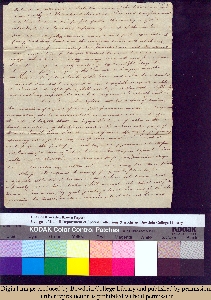 ― [page break] ― ― [page break] ―
Westmoreland, and none, in which the manners of the Inhabitants are
more worthy of Philosophical observation. I had read but few accounts
and those slender and imperfect of either the country or of the
Inhabitants. But I was then possessed of a map of the northern
provinces wonderfully extensive accurate and picturesque, and my
fancy had long brooded on the scanty materials with which my
various and diffusive reading had furnished me, with the utmost
ardour and intenceness. I longed to reduce the vague but brilliant
images, which had amused my visionary hours, into some form and order
I had often imagined myself wandering, by Moonlight, along the
shining and pebly margin of the Darwent, or hanging over the
verdant and precipitous banks of the Eden, and could have described
a scene that would have equalled, were it possible to equal, reality,
but I was then doubtful of my Skill, and began to think that before they
could, with any propriety, be described, they must be actually visited.
I was also much delighted with the prospect of describing
the meditations of a youth of the deepest penetration and the most vigorous
imagination, (who had studied books and conversed with mankind.) on
the sublimest Subjects that can ingage the human faculties, on the uses
bounds and relations of the Sciences and on the nature and capacity of
the soul. I easily foresaw that this would furnish opportunity for forming
explaining and digesting my own opinions, and that I could, at all
events, perform this part of my work by making judicious extracts from
"The Journal of a Visionary," which I had written the year before, but I was
quickly sencible that this would lead me too far from ‸ my principal design
That it would render my work too voluminous, and my plan too complicated
I therefore still postponed the opening of my work. Julius by his
indefatigable application to his pen and his book, in a short time almost
irreparably injured his constitution; which was naturally delicate and feeble
He was under a necessity of relinquishing his studies, and, for the sake
of restoring his health, made an excursion into Wales and Cornwal.
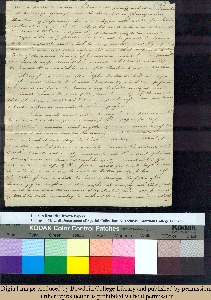 ― [page break] ― ― [page break] ―
His indisposition increases, and ‸ he becomes dangerously sick in an obscure Inn
at the Village of Margam near the Severn Sea, in Glamorganshire.
Here then my performance opened and began with a letter from Julius
written at Margam, when he supposed his death to be near at hand, and
and expected to be carried from this apartment only to his grave, and
addressed to the lovely Julietta, his sister and his friend. He however
happily escapes the death which he imagined to be inevitably impending
And, in his subsequent letters informs his sister, that Mr Wentworth the
Rector of the parish, hearing of his situation, visited him and prevailed
upon him to suffer himself to be removed to his house, where by
the benevolent and hospitable care of Mr. Wentworth and his daughter—
Ah! My friend! That daughter! Sophia Wentworth! With what a pen
of passion did I describe her beauties! How liberally did I shower perfection
on her mind and person! The Image of my Henrietta rose before me. Then
did, I indeed, assume the person of My hero. Then quickly
[gap]
‸ did the studious
philosophical and contemplative Julius undergo a transformation, and become
a tender passionate romantic lover! like myself!—
Julius quickly recoved and continuing his correspondence with
his sister, relates the origin and progress of his passion for Miss
Wentworth. The invitation which her father offers and he accepts to pass the
Summer at his house; describes the country and its Inhabitants, the
manner in which he employs his time, and his long and interesting
conversations with Sophia, and a variety of remarkable incidents which
I, at this time, do not exactly recollect. I make the conduct of Sophia
a pattern of prudence and delicacy. And though she is equally enamoured with Juliyus
it is with the utmost difficulty the confession is extorted from her. At length however
he prevails upon her to declares her sentiments; He then formally proposes himself
to her Sophia's father, and solicits her hand in Marriage. The father after
the discovery of his daughters inclination scruples not to comply with this proposal
provided he can obtain the concurrence of Mrs. Brownlow. Julius addresses himself
by letter to his Mother, acquainting her with all those circumstances and soliciting
 ― [page break] ― ― [page break] ―
her consent to his union with Sophia. I have already described Mrs. Brownlowe
to be a woman of Ambition. She doats on Julius, but regards his marriage not
as the means of domestic felicity but as an instrument of advancement of
in his rank and fortunes. To make himself richer than he is at present
and to allye himself to nobility she considers as the only purpose of his
being, and as she herself never felt the inchantments of love, She imagines
that they have no reality, and believes that every man is governed in
the choice of his wife by motives of interest. She has therefore been ‸ for some
time past, busily imployed in searching for a lady, who shall possess
the requisate quallifications of youth beauty and wealth, and whom she
shall think worthy to be presented to her Julius as his wife.
In the Neighbourhood of Keswick there resided a venerable
Nobleman whom I have denominated Lord Monthievers. His only daughter
and the heiress of all his possessions was Caroline Monthievers; of the same
age with Julietta, and as lovely and accomplished as her friend; for
Caroline and Julietta, living within a small distance from each other
are friends and visitants. Julius, on his return from Gottingen, was introduc=
=ed to Caroline, and made an impression on her tender and susceptable
heart, which gradually grew stronger. She frequently visited Julietta,
and on these visits was treated by Julius with the utmost politeness
and respect, but he felt no particular Attachment to her, and was
utterly a stranger to those emotions which his presence always excited
in the bosom of Caroline. Her delicacy would not suffer her to make the
first advances. Her condition, therefore, was hopeless, and her grief preying
on her health and spirits, reduced her at length to a state of so much
weakness, as greatly to alarm her father, whose life and happiness
depended upon those of his daughter. Many fruitless efforts were made
to discover the cause of her malady. At length however the drooping
Caroline was prevailed upon to disclose. Parental fondness was superior
to every other passion in the breast of Lord Monthievers, and the
consideration of his daughters life, which could not be otherwise
preserved, induced him to acquaint the Mother of Julius with
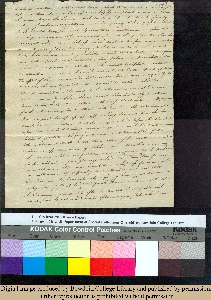 ― [page break] ― ― [page break] ―
Carolines situation and to declare his readiness to negotiate a Marriage
between their children. This affair was highly acceptable to that ambitins
she acknowledged the honour which his lordship intended her family
in terms of unlimited gratitude, and imagining
[gap]
it impossible that
her Son should have the least objection to so advantageous an offer, the
marriage was immediately determined upon. At this period Mrs. Brownlow
was seized with a severe sickness, which disabled her from communicating
the intelligence of those proceedings to Julius, under her own hand;
And, while she was directing Juilietta to write to her brother and inform
him of those particulars. that letter from Julius was presented to her
in which he explains his situation with respect to Sophia; mentions
his intentions to make her his wife, and intreats her to approve of them
The effect of this unseasonable letter on Mrs. Brownlowe may easily be
concieved; she directs Julietta to acquaint her brother with her
total disapprobation of his conduct; her utter and irreconcilable aversion
to his union with Sophia. She commands him instantly to return
home, to break off all connection with Miss Wentworth, and to prepare
for the celebration of his Nuptials with Caroline. She tells him also
that she finds herself rapidly approaching her end, beseaches him
him to hasten his return that she may see him before she dies, bestow
upon him her last blessing and charge him with her last command
Julius is agitated with grief and dispair at the reception of this
letter, explains to Mr Wentworth the condition of his mother, and, after
taking an affecting leave of Sophia, who acts on this, as on every
other occasion, with heroic fortitude and magnanimity, he prepares
for his departure from Glamorganshire. Mrs Brownlow finding
her death nearer than was expected, and hopeless of ever seeing her
son, writes down, with difficulty, her sentiments with respect to
Caroline and Sophia, solemnly adjuring him, by all the sacred
obligations of filial piety to forsake the one and wed the other
Julius arrives immediately after her decease. He is affected with
the deepest Sorrow, is determined after many conflicts, which are
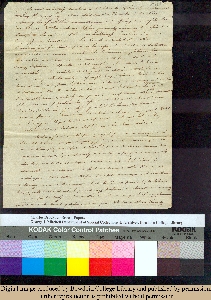 ― [page break] ― ― [page break] ―
copiously and minutely described in his letters to Sophia, he is determined
to obey the dying injunctions of his Mother. He writes to Caroline,
informing her of all those circumstances, and offering himself to her
acceptance. In this resolution Sophia generously endeavours to confirm him
though at the expense of her own happiness. Caroline in answer
his proferred hand, since his heart is devoted to another.
Caroline justifies and explains her refusal in letters to Julietta
and Juliette in answer describes the behavious of Julius, her
conversations with him and her endeavours to perswade him to
Marry Sophia, in opposition to his mothers exhortations. Julius is
immoveable in his resolution to obey ‸ his Mother so far as obedience is in his power
and is torn by all the violence of conflicting passions. He spends his
hours in writing to Juli Sophia, and in describing in strong colours his
desperate condition. He wishes to die but will not hasten his death.
His health, however, rapidly decays, and, in compliance with ‸ the importunities
of his sister and of Caroline, he passes over to the continent, intending
to reside for the rest of his life, of which he knows the period is
near, in Provence or Dauphinè. He is taken sick in an unfrequent Rhod
in Picardy, is obliged to stop at a peasants hut, and after writing
pathetic letters to Julietta, Sophia and Caroline— dies—
Such, my friend, was the plan of my performance, in writing which
I had like to have undergone the fate of Julius, so violent were my emotions
and so thoroughly did I feel all that I imputed to Julius: towards the
conclusion, indeed, I grew absolutely sick with weeping; and was scarcely
able to proceed to the Catastrophe. All the incidents which I have above
related, their circumstances and effects are described with the utmost
minuteness, in letters between the four principal personages, written, as it were,
to the very moment. These events which happened previously to Julius's
Journey into Wales, at which period my performance opened, are occasionaly
and more particularly related in the Correspondence of which my Romance
consists. From the Arrival of Julius at Margam till his death in Picardy
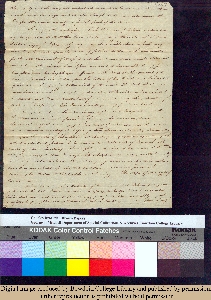 ― [page break] ― ― [page break] ―
I have supposed the busy and important interval to be no more than three
months and ten days, and therefore though it be more voluminous than
Clarissa, it occupies scarcely a fourth part of the time.
So strong is the impression which the woes of Julius produced on
my Imagination, that, to this hour, in lamenting the evils which have
befallen myself, I frequently confounds them with those which my
invention heaped upon the head of Julius. As this work was written
for the entertainment of Miss G— to her it was, piece meal, delivered
and subsequent accidents have I fear rendered it irrecoverable. O my friend!
how often were her bright eyes suffused with tears, at the perusal of it!
how many sighs did it draw from the bottom of her heart! and how did I
rejoice at such affecting testimonials of its merit! The last Sheet was
accompanied with an epistolary dedication to Henriette, which (shall I
venture to say it?) is a Masterpiece, if it be considered as the production of
Youth and Inexperience. This I will shew to you, my friend, in due time.
Did you ever observe the extraordinary influence of Imagination over the
the actions and sentiments of men? In assuming the persons or placing ourselves in
the situations of others, we enjoy a new kind of existance, and think and
act in a manner wonderfully befitting their
‸ our assumed characters. I have often
sat upon the rocks of Schuylkill, and shutting my eyes, imagined myself
to be the identical Julius, to be transported to the vale of Keswick or the
banks of Eden, to be sitting within sight and hearing of the torrent, to have ‸ torn
[gap]
away from a rugged stone the moss with whitch it was covered, and to be employe
in writing a letter to Lauder Ellen: that young man so worthy to be called my
friend; so remarkable for elevated Ambition and towering genius, who is
pursuing his studies at the temple and treading in the steps of Murray & of
Erskine —
What! have I reached the bottom of the second sheet? I have put your
patience to the test. I am almost ashamed of my prolixity. I have hitherto acted
Julius, but next week must personate my good friend Ellen, and apply myself
indefatigably, for eight or ten days, to law; after which I will again metamorphose myself
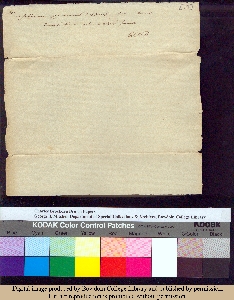 ― [page break] ― ― [page break] ―
into Julius, and enjoy as much happiness as heaven, permits.
Farewell, "Φιλτατε 'ανδων δε φιλων" farewell
C.B.B
|